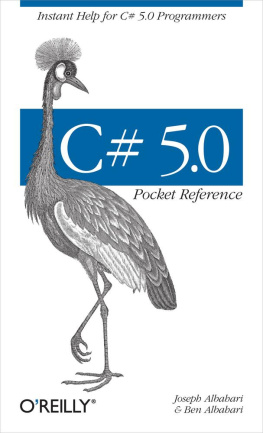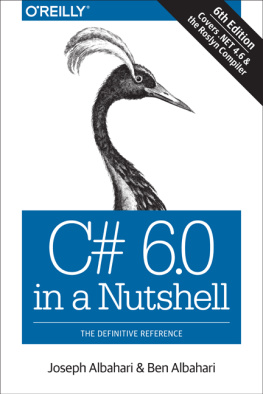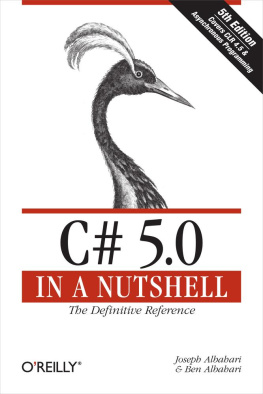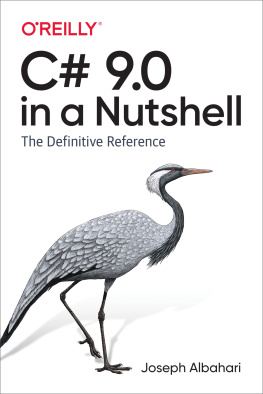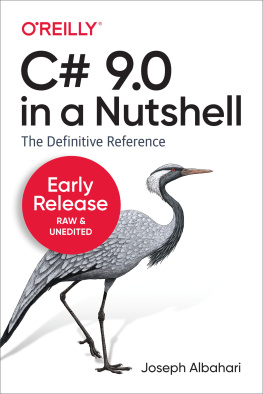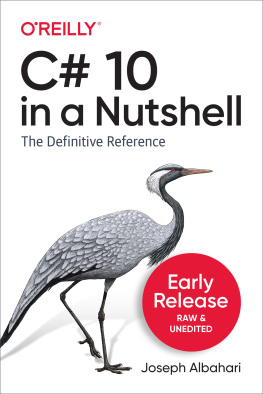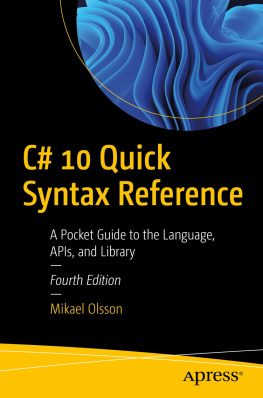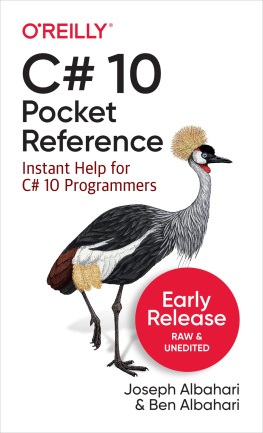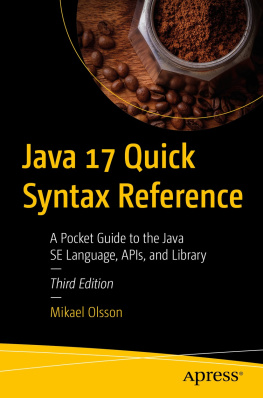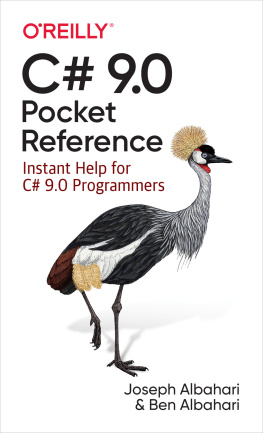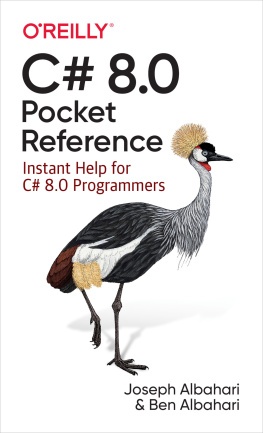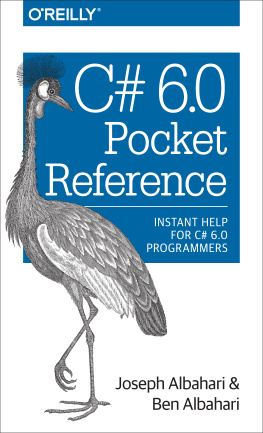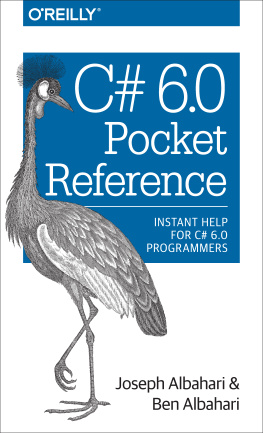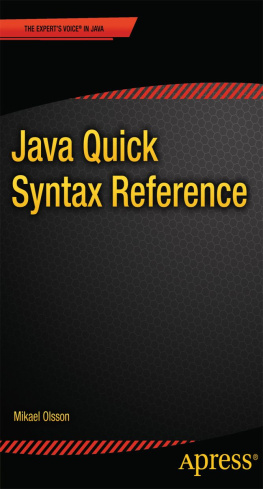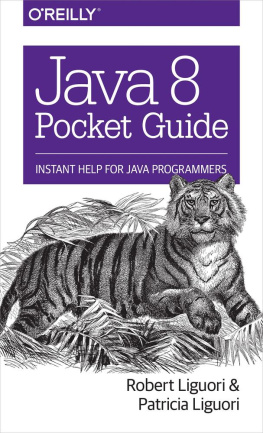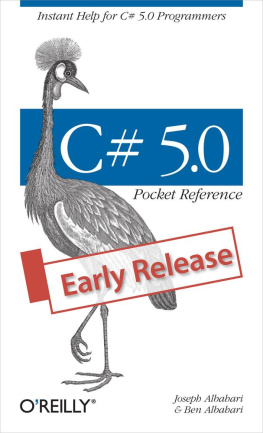Joseph Albahari - C# 5.0 Pocket Reference
Here you can read online Joseph Albahari - C# 5.0 Pocket Reference full text of the book (entire story) in english for free. Download pdf and epub, get meaning, cover and reviews about this ebook. publisher: OReilly Media, genre: Computer. Description of the work, (preface) as well as reviews are available. Best literature library LitArk.com created for fans of good reading and offers a wide selection of genres:
Romance novel
Science fiction
Adventure
Detective
Science
History
Home and family
Prose
Art
Politics
Computer
Non-fiction
Religion
Business
Children
Humor
Choose a favorite category and find really read worthwhile books. Enjoy immersion in the world of imagination, feel the emotions of the characters or learn something new for yourself, make an fascinating discovery.
- Book:C# 5.0 Pocket Reference
- Author:
- Publisher:OReilly Media
- Genre:
- Rating:3 / 5
- Favourites:Add to favourites
- Your mark:
- 60
- 1
- 2
- 3
- 4
- 5
C# 5.0 Pocket Reference: summary, description and annotation
We offer to read an annotation, description, summary or preface (depends on what the author of the book "C# 5.0 Pocket Reference" wrote himself). If you haven't found the necessary information about the book — write in the comments, we will try to find it.
When you need answers for programming with C# 5.0, this practical and tightly focused book tells you exactly what you need to knowwithout long introductions or bloated samples. Easy to browse, its ideal as quick reference or as a guide to get you rapidly up to speed if you already know Java, C++, or an earlier version of C#.
C# 5.0 Pocket Reference — read online for free the complete book (whole text) full work
Below is the text of the book, divided by pages. System saving the place of the last page read, allows you to conveniently read the book "C# 5.0 Pocket Reference" online for free, without having to search again every time where you left off. Put a bookmark, and you can go to the page where you finished reading at any time.
Font size:
Interval:
Bookmark:
Joseph Albahari is author of C# 3.0 in a Nutshell, LINQ Pocket Reference, and C# 3.0 Pocket Reference. He has been developing large-scale enterprise applications on .NET and other platforms for more than 15 years, and is author of LINQPad, the popular utility for querying databases in LINQ. Joseph is currently a freelance consultant.
Ben Albahari is the founder of Take On It. He was a Program Manager at Microsoft for 5 years, where he worked on several projects, including the .NET Compact Framework and ADO.NET.
Ben was the cofounder of Genamics, a provider of tools for C# and J++ programmers, as well as software for DNA and protein sequence analysis. He is a co-author of C# Essentials, the first C# book from O'Reilly, and several editions of C# in a Nutshell.
C# is a general-purpose, type-safe, object-oriented programming language. The goal of the language is programmer productivity. To this end, the language balances simplicity, expressiveness, and performance. The C# language is platform-neutral, but it was written to work well with the Microsoft .NET Framework . C# 5.0 targets .NET Framework 4.5.
The programs and code snippets in this book mirror those in Chapters 2 through 4 of C# 5.0 in a Nutshell and are all available as interactive samples in LINQPad. Working through these samples in conjunction with the book accelerates learning in that you can edit the samples and instantly see the results without needing to set up projects and solutions in Visual Studio.
To download the samples, click the Samples tab in LINQPad and click Download more samples. LINQPad is freego to http://www.linqpad.net.
The following typographical conventions are used in this book:
Indicates new terms, URLs, email addresses, filenames, and file extensions.
Constant widthUsed for program listings, as well as within paragraphs to refer to program elements such as variable or function names, databases, data types, environment variables, statements, and keywords.
Constant width boldShows commands or other text that should be typed literally by the user.
Constant width italicShows text that should be replaced with user-supplied values or by values determined by context.
This icon signifies a tip, suggestion, or general note.
This icon indicates a warning or caution.
This book is here to help you get your job done. In general, you may use the code in this book in your programs and documentation. You do not need to contact us for permission unless youre reproducing a significant portion of the code. For example, writing a program that uses several chunks of code from this book does not require permission. Selling or distributing a CD-ROM of examples from OReilly books does require permission. Answering a question by citing this book and quoting example code does not require permission. Incorporating a significant amount of example code from this book into your products documentation does require permission.
We appreciate, but do not require, attribution. An attribution usually includes the title, author, publisher, and ISBN. For example: C# 5.0 Pocket Reference by Joseph Albahari and Ben Albahari (OReilly). Copyright 2012 Joseph Albahari and Ben Albahari, 978-1-449-3201-71.
If you feel your use of code examples falls outside fair use or the permission given above, feel free to contact us at .
Safari Books Online (www.safaribooksonline.com) is an on-demand digital library that delivers expert content in both book and video form from the worlds leading authors in technology and business.
Technology professionals, software developers, web designers, and business and creative professionals use Safari Books Online as their primary resource for research, problem solving, learning, and certification training.
Safari Books Online offers a range of product mixes and pricing programs for organizations, government agencies, and individuals. Subscribers have access to thousands of books, training videos, and prepublication manuscripts in one fully searchable database from publishers like OReilly Media, Prentice Hall Professional, Addison-Wesley Professional, Microsoft Press, Sams, Que, Peachpit Press, Focal Press, Cisco Press, John Wiley & Sons, Syngress, Morgan Kaufmann, IBM Redbooks, Packt, Adobe Press, FT Press, Apress, Manning, New Riders, McGraw-Hill, Jones & Bartlett, Course Technology, and dozens more. For more information about Safari Books Online, please visit us online.
Please address comments and questions concerning this book to the publisher:
| OReilly Media, Inc. |
| 1005 Gravenstein Highway North |
| Sebastopol, CA 95472 |
| 800-998-9938 (in the United States or Canada) |
| 707-829-0515 (international or local) |
| 707-829-0104 (fax) |
We have a web page for this book, where we list errata, examples, and any additional information. You can access this page at:
| http://oreil.ly/CSharp5_PR |
To comment or ask technical questions about this book, send email to:
For more information about our books, courses, conferences, and news, see our website at http://www.oreilly.com.
Find us on Facebook: http://facebook.com/oreilly
Follow us on Twitter: http://twitter.com/oreillymedia
Watch us on YouTube: http://www.youtube.com/oreillymedia
Here is a program that multiplies 12 by 30, and prints the result, 360, to the screen. The double forward slash indicates that the remainder of a line is a comment .
using System; // Importing namespaceclass Test // Class declaration{ static void Main() // Method declaration { int x = 12 * 30; //Statement 1 Console.WriteLine (x); // Statement 2 } // End of method} // End of class At the heart of this program lie two statements . Statements in C# execute sequentially and are terminated by a semicolon. The first statement computes the expression12 * 30 and stores the result in a local variable , named x, which is an integer type. The second statement calls the Console classs WriteLinemethod to print the variable x to a text window on the screen.
A method performs an action in a series of statements called a statement block a pair of braces containing zero or more statements. We defined a single method named Main.
Writing higher-level functions that call upon lower-level functions simplifies a program. We can refactor our program with a reusable method that multiplies an integer by 12, as follows:
using System;class Test{ static void Main() { Console.WriteLine (FeetToInches (30)); // 360 Console.WriteLine (FeetToInches (100)); // 1200 } static int FeetToInches (int feet) { int inches = feet * 12; return inches; }}A method can receive input data from the caller by specifying parameters and output data back to the caller by specifying a return type . We defined a method called FeetToInches that has a parameter for inputting feet, and a return type for outputting inches, both of type int (integer).
The literals
Font size:
Interval:
Bookmark:
Similar books «C# 5.0 Pocket Reference»
Look at similar books to C# 5.0 Pocket Reference. We have selected literature similar in name and meaning in the hope of providing readers with more options to find new, interesting, not yet read works.
Discussion, reviews of the book C# 5.0 Pocket Reference and just readers' own opinions. Leave your comments, write what you think about the work, its meaning or the main characters. Specify what exactly you liked and what you didn't like, and why you think so.

